- Home
- Clarice Lispector
The Passion According to GH Page 3
The Passion According to GH Read online
Page 3
A step away from the climax, a step away from the revolution, a step away from what is called love. A step away from my life—which, because of a kind of strong reverse magnet, I wasn't making into a life; and also because of a will to order. Life's disorder is bad taste. And even I wouldn't have known how to transform that latent step away into a real step if I had wanted to. Because of pleasure in a harmonious coherence, because of the greedy, ever-promising pleasure of holding and not having to put out—I didn't need the climax, the revolution, or even that prelove that is so much happier than love itself. Was the promise all I needed? Yes, just a promise.
Maybe that attitude—or lack of attitude—also came from the fact that never having married or borne children I haven't, so to speak, had to wear any shackles, or break any: I've been continuously free. Being continuously free has been helped along by my facile nature: I eat and drink and sleep facile. And of course my freedom has also come from my financial independence.
I suppose my habit of thinking only at the moment when it is necessary came from my sculpture, for it taught me to think only with my hands and only at the time of using them. Also from my intermittent sculpting came my habit of pleasure, to which I already tended by nature: my eyes had handled the form of things so much that I became more and more accustomed to pleasure and rooted myself in it. I could, with much less than my whole self, I could work with anything: just like yesterday at the coffee table, where all I needed to form round forms from the bread heart was the surface of my fingers and the surface of the bread. To do what I could do I had never needed either suffering or talent. What I had in my power wasn't for me a conquest, it was a natural gift.
And among women and men, what was I? I have always had an extremely tender admiration for male habits and ways of doing things and take an unurgent pleasure in being female, being female was also a natural gift for me. I've only had a facility for such gifts and not the awe of any vocation—I think that's it, isn't it?
From the table over which I was lingering because I had time, I looked around, while my fingers were making the bread heart into balls. The world was a strange place.
Which allowed me to live: in the world I could stick one little ball of bread heart to another, I just needed to put one beside the other and then all I had to do was push them together, with very little effort, just enough for one surface to adhere to the other, that way, pleasurefully, I was making a curious pyramid that gave me pleasure: a right triangle made of round forms, a form made up of forms opposite to itself. If that had any meaning for me, the bread heart and my fingers probably knew what it was.
The apartment reflects me. It's on the top floor, which is considered elegant. People in my circle try to live in the so-called penthouse. It's more than elegant. It's a real pleasure: you can command a city from up here. When that elegance becomes common, will I, without even thinking why, move to another kind of elegance? Maybe. Just like me, the apartment has moist lights and shadows, nothing here is sharp: one room precedes and anticipates the next. From my dining room I could see the mixture of shadows that formed a prelude to the living room. Everything here is the elegant, ironic, witty riposte of a life that has never existed anywhere: my home is merely an artistic creation.
In fact, everything here refers to a life that, if it were real, would little serve me. What does it trace out, then? If it were real, I wouldn't understand it, but I enjoy the copy and understand it. The copy is very pretty. The circle of artistic and semiartistic people that I live in should, however, make me disdain copies; but I have always seemed to prefer parody, it has served me well. Tracing a life probably gave me—or does it still? to what extent has the harmony of my past life exploded?—tracing a life probably gave me a sense of security precisely because the life wasn't mine: it wasn't a responsibility that I had to deal with.
The slight, generalized pleasure—which seems to have been the tone in which I live, or lived—has perhaps come from the fact that the world was neither me nor mine: I could take pleasure in it. Just as I had not made men mine either and could therefore admire and sincerely love them, as one loves nonegotistically, as one loves an idea. Since they were not mine, I never tortured them.
As one loves an idea. My home's witty elegance comes from the fact that everything here is in quotation marks. To be honest about true authorship, I cite the world, I have repeatedly cited it, since it was neither me nor mine. Was beauty, a certain land of beauty, my object, as it is for everyone? did I live in beauty?
As for myself, without either lying or telling the truth—just as in that moment yesterday morning when I was sitting at the coffee table—as for myself, I have always kept one quotation mark to my left and another to my right. In a certain sense, "as if it wasn't me" was wider than if it was—a nonexistent life completely possessed me, occupied me like an invention. Only in the photograph, when the negative was developed, was there something else developed as well—something which, not accomplished by me, was accomplished by the snapshot: when the negative was printed it showed my ectoplasmic presence. Is photography the portrait of a concavity, of a lack, of an absence?
All the while I was, more than just clean and correct, I was a pretty riposte. For all that is probably what makes me pretty and generous. A man of experience has only to glance at me to tell that here is a woman of grace and generosity, one who is no bother, who doesn't tear a man down: a woman who smiles and laughs. I respect others' pleasure, and I take my own pleasure delicately, tedium nourishes me and delicately consumes me, the sweet tedium of a honeymoon.
That image of myself between quotation marks used to satisfy me, and not just superficially. I was the image of what I wasn't, and that image of my nonbeing fulfilled me entirely: one of the strongest ways of being is to be negatively. Since I didn't know what I was, "nonbeing" was my closest approximation to truth: at least I controlled the flip side: I at least had the "non," I had my opposite. What was good for me I didn't then know; I experienced, with some pre-fervor, what was bad for me.
And in experiencing that "bad," I experienced the backside of what I couldn't even try to want or to attempt. Just like someone who leads a life of "depravity" with peril and love and at least has the opposite of what she neither knows nor wants nor can achieve: the life of a nun. Only now do I know that I had everything in my hands, though in a backward way: I was dedicating myself to every detail on the non side. Through nonbeing in detail, I proved to myself that—that I was.
That manner of nonbeing was much more pleasant, much cleaner: for, with no irony now, I am a woman of spirit. And of spirited body. At the coffee table, I was framing myself in my white robe, my clean, well-sculpted face, and my simple body. From me there irradiated the kind of dignity that comes from indulgence in one's own pleasures and in others' pleasures. I was delicately consuming my own and delicately wiping my mouth with the napkin.
That her, G. H. in the luggage leather, was me; is it. . . still? No! Hence I calculate that the hardest thing my vanity will have to face will be my own judgment: I shall-have all the appearance of one who has experienced failure, and only I shall know if it was requisite failure.
Only I shall know if it was requisite failure.
I arose at last from the coffee table, that woman. Since there was no maid that day, I would be engaging in the sort of activity I liked most: cleaning up. I've always liked putting things in their places. I think it's my only true calling. By ordering things I create and understand at the same time. But since, through reasonably well-placed investments, I have gradually become pretty well-off, I've been kept from putting that calling into practice: if I hadn't belonged to the class that I do by reason of both money and culture, I would normally have had a domestic's job in some rich people's great house, where there is a great deal to put in order. Ordering is finding the best form. If I had been a domestic like that, I wouldn't even have needed my dilettantish sculpture; if I could have liberally ordered with my hands. Ordered form itself?
&n
bsp; I found the ever-forbidden pleasure of putting a house in order so great that even while I sat at the table, I had already begun to take pleasure in the mere planning of it. I looked out around the apartment: where should I start?
Also because afterward, at the seventh hour, just as on the seventh day, I'd be free to rest and have the remainder of a day in repose. Repose almost without joy, which would be a good balance for me: from my hours of sculpture I had learned almost joyless calm. I had enjoyed myself too much the last week, had gone out too much, had had too much of whatever I wanted, and I now wanted the day to be exactly as it promised to be: toilsome and empty and good. I would make it go as long as possible.
Maybe I'd start by organizing the back of the apartment: the maid's room was probably filthy, what with its dual function of sleeping quarters and storeroom for old suitcases and clothes, back newspapers, leftover wrapping paper and string. I'd get it clean and ready for the new maid. Then, from that end of the apartment, I would progress slowly, "climbing" horizontally to the opposite end, the living room, where—as though I myself were the finishing point of the cleaning and of the morning—I would stretch out on the sofa and read the newspaper, probably drowsing in the process. If the telephone didn't ring.
With that in mind, I decided to take the phone off the hook, to be sure that I wouldn't be bothered by anything.
How can I now explain that at that very moment I had begun to see something that would become clear only later? without knowing it I was now in the antechamber of the room. I had begun to see and I didn't know it; I had seen since I was born and I didn't yet know it, I didn't know it.
Give me your anonymous hand, for life is giving me pain and I don't know how to go on talking—reality is too delicate, only reality is delicate, my unreality and my imagination are more substantial.
Having decided to start my ordering in the maid's room, I went through the kitchen, which leads to the service area. At the end of the service area the hallway starts that leads to the maid's room. Before going on, however, I leaned against the wall in the service area to finish smoking my cigarette.
I looked down: thirteen floors of building below. I didn't know that all of it was already playing a part in what was going to happen. The process had probably begun a thousand times before and had then been led astray. This time it would go all the way to its end, and I didn't foresee it at all.
I looked at the inside area, the backs of all the apartments, for which my own apartment too existed as a back. On the outside, my building was white, with the smoothness of marble and the smoothness of finished surface. But on the inside, the inside area was a chaotic jumble of square blocks, windows, dark streaks and blotches from the rain, window snarling at window, mouths looking into mouths. My building's mass was like a factory's. The miniature of a vast landscape of passages and canyons: smoking there, as though on a mountaintop, I looked out over the view, probably with the same inexpressive gaze that could be seen in the photographs of me.
I saw what all of that expressed: it all expressed nothing. And I took in that nothing with great attentiveness, took it in with what was in my eyes in those pictures; only now do I know that I was continuously receiving that silent signal. I looked down at the inside area. All of it had an inanimate richness about it that recalled the richness of nature itself: here you could also prospect for uranium and from here oil could gush forth.
I was seeing what only later would I feel—I mean, only later would I experience a profound loss of meaning. Only later would I understand: what seems a lack of meaning ... is what meaning there is. Every instant of "lack of meaning" is precisely the frightening certainty that it is there that meaning lies and that I not only can't reach it but don't want to because there are no guarantees. Only later would the lack of meaning besiege me. Could a sense of the lack of meaning have always been my negative mode of sensing meaning? it had been my participation.
What I was seeing in the monstrous, machine insides that was the inside area of my building, what I was seeing were things that had been made, eminently practical things with practical purposes.
But something of terrible, general nature—which I would later experience within myself—something of fateful nature had fatefully come forth from the hands of the hundred practical workmen who had installed water and drainpipes, wholly unaware that they were constructing this Egyptian ruin at which I was now staring with the stare that was in the photographs of me on the beach. Only later would I know that I had seen: only later, after seeing the secret, did I realize that I had already seen it.
I tossed the lighted cigarette over the edge and took a step back, slyly hoping that no neighbor would link me to that act prohibited by the Building Management. After a moment, I carefully stuck my head out and looked down: I couldn't even tell where the cigarette had landed. The precipice had silently swallowed it up. Was I thinking then? at least I was thinking about nothing. Or maybe about the possibility that some neighbor had seen me commit that forbidden act, which didn't go at all with the cultured woman that I was pictured as being, which made me smile.
Then I went up the dark hallway that leads to the service area.
I went up the dark hallway that leads to the service area.
In that hallway, which forms the very back of the apartment, two doors face each other, indistinct in the shadows: the service exit and the door to the maid's quarters. The outback of my home. I opened the door to the expectation of stacks of newspapers and a dark pile of storage and junk.
But as I opened the door, I had to squint in reaction and in physical revulsion.
Instead of the jumbled shadows that I was expecting, I encountered the vision of a room that was a quadrangle of white light; my eyes squinted in self-protection.
For the past almost six months —the length of time that maid had been with me—I had not ventured in there, and my astonishment came from finding a completely clean room.
I had expected to find dark corners, I had prepared myself to have to throw the window wide open and bathe musty darkness with fresh air. What I hadn't expected was that the maid, without saying anything to me, had fixed the room up the way she wanted it, and, acting as though she owned it herself, had done away with its function as a storage area.
From the doorway I now looked in on a room that had about it a calm, empty order. Without telling me, the maid had opened up a dry, empty space in my fresh, cozy, moist home. What I had now was a room that was completely clean and shiny, like a room in an insane asylum from which all dangerous objects have been removed.
Here, now, because of the space that had been created, were concentrated the reverberations from the roofs, from the cement terraces, from the erect antennae of all the neighboring buildings, from the reflections of a thousand building windows. The room seemed to occupy a level much higher than that of the rest of the apartment.
Like a minaret. My first impression of a minaret began with this room: free-floating above a limitless expanse. At the time, I perceived only my physical discomfort with that impression.
The sides of the room weren't uniform: two of the angles were slightly greater than square. And while that was its physical reality, it descended upon me as though it was my own vision that was deforming it. It seemed like a paper representation of how I might perceive a four-sided figure: already deformed in its lines of perspective. The concretization of a flaw in vision, the materialization of an optical illusion. Its not being entirely regular in its angles gave it an appearance of basic fragility, as though this minaret of a room were not attached to either the apartment or the building.
From the door I could see the sharp line of the sun cutting off half the ceiling and a third of the floor with black shadow. Six months of permanent sun had warped the pine wardrobe and denuded the whitewashed walls to even greater whiteness.
And it was on one of the walls that, recoiling in surprise and revulsion, I saw the unexpected mural.
On the whitewashed wall by the
door—that's why I hadn't seen them before—were charcoal outlines, in about life size, of a nude man, a nude woman, and a dog more nude than dogs really are. What the nudity disclosed was not drawn in on the bodies, the nudity came merely from the absence of all covering: they were the shapes of empty nudity. The lines were thick, made with a broken-tipped piece of charcoal. In places they were doubled, as though one line were the mark of the other's trembling. A dry trembling by dry charcoal.
The lines' rigidity fixed the outsized, crazy figures to the wall like three automatons. Even the dog had the tame insanity of something that is not powered by a force of its own. The clumsiness of the overbold lines made the dog seem to me something solid and petrified, set more in itself than on the wall.
After I got over the initial surprise of finding this hidden mural in my own home, I looked more closely, now with amused surprise, at these isolated figures on the wall. The simplified feet didn't quite touch the floor line, the small heads didn't reach the ceiling line, and that, along with the stupid rigidity of the lines, gave the three isolated figures the appearance of three mummies. As the figures' harsh motionlessness bothered me more and more, the notion of mummies grew stronger and stronger. They stood out as though they had gradually oozed forth from the inside of the wall, had slowly come from the core, finally reaching the harsh lime surface.
None of the figures was touching, and the three didn't form a group: each figure stared straight ahead, as though it had never looked sideways, as though it had never seen any of the others and had no idea that anyone existed beside it.
I gave a constrained smile, I was trying to smile: because each figure was there on the wall, just as I was there, standing rigid in the doorway. The drawing was not a decoration, it was writing.
I was assailed by a recollection of the absent maid. I tried to remember her face, and was amazed that I could not—she had been able to exclude me so completely from my own home that it was as if she had closed the door on me and left me far from my own lodging. Recollection of her features escaped me, it must be just a temporary lapse.

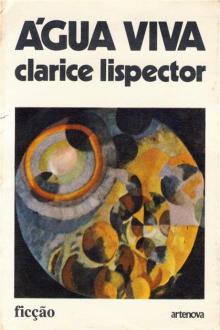 The Stream of Life
The Stream of Life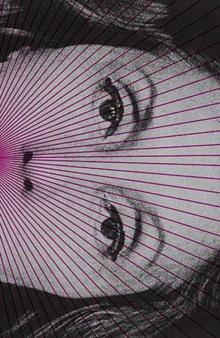 The Complete Stories
The Complete Stories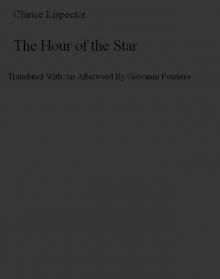 The Hour of the Star
The Hour of the Star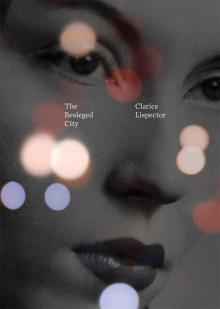 The Besieged City
The Besieged City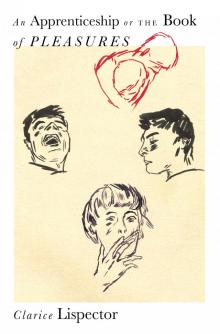 An Apprenticeship or the Book of Pleasures
An Apprenticeship or the Book of Pleasures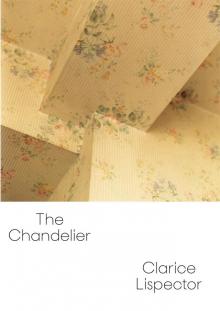 The Chandelier
The Chandelier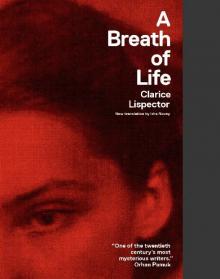 A Breath of Life
A Breath of Life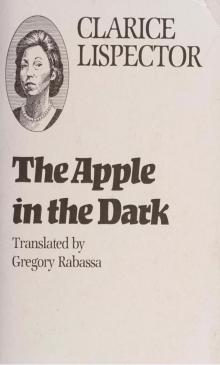 The Apple in the Dark
The Apple in the Dark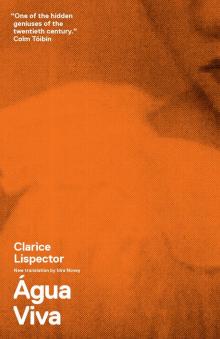 Agua Viva
Agua Viva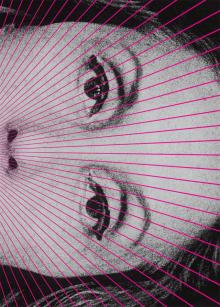 Complete Stories
Complete Stories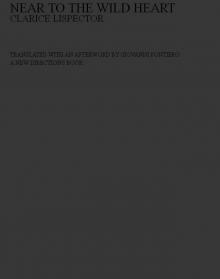 Near to the Wild Heart
Near to the Wild Heart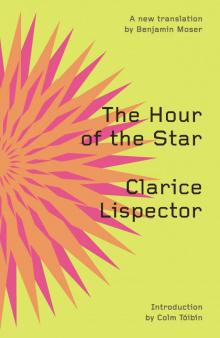 The Hour of the Star ()
The Hour of the Star ()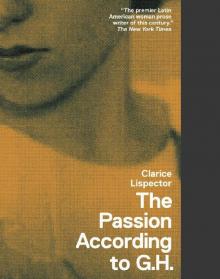 The Passion According to G.H.
The Passion According to G.H.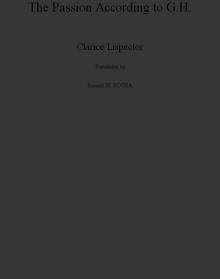 The Passion According to GH
The Passion According to GH